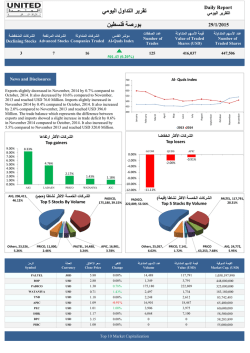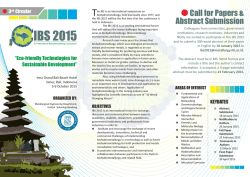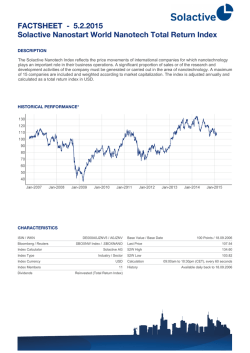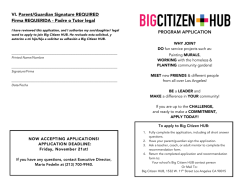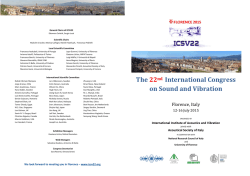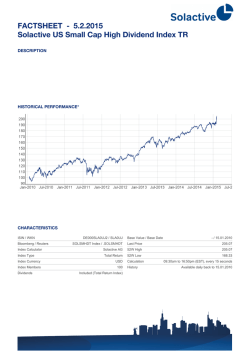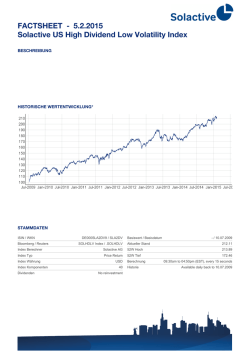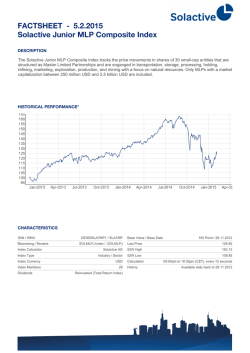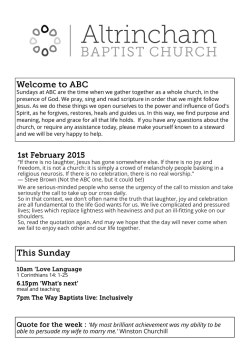
Two-pager made available at the event
Financing Sustainable Energy for All in the Post-2015 Era In order to achieve the three objectives of Sustainable Energy for All (SE4ALL) by 2030, current annual investments need to be doubled in the areas of energy access, energy efficiency and 1 renewable energy. The first SE4ALL Global Tracking Framework report concluded that it is more feasible to achieve the three objectives jointly than to pursue any one of them individually. The current level of annual investment in access needs to go up from USD 9 billion to 45 billion, in renewables from USD 154 billion to 320 billion, and in energy efficiency from USD 225 billion to 390 billion. Formidable barriers remain and need attention, including enhancing local and regional capital markets, developing policy frameworks and strengthening human capacity to develop the necessary nd deal pipeline. Commitments of many partners are already being catalyzed. The 2 annual United Nations Sustainable Energy for All Forum in May will focus on “Financing Sustainable Energy for All”, including the launch of a new Global Sustainable Energy for All Commitment Platform. Many investments facilitate further investments through co-funding arrangements. The European Commission and individual European countries are already committed, in support of Sustainable Energy for All, to back developing countries in their efforts to reduce poverty by more than 600 million people within two decades. SE4ALL has also signed an Aide Memoire for Cooperation with the United States Power Africa initiative to forge stronger cooperation in our work in the region. European and U.S. commitments alone mean that we can halve energy poverty by 2030. In order to facilitate further progress, a Committee on Scaling Up Finance for Sustainable Energy Investments has been established as one of the four committees of the SE4ALL Advisory Board. The Committee is being co-led by Dr. Luciano Coutinho, President of the Brazilian National Development Bank (BNDES) and Mr. Purna Saggurti, Chairman of Global Corporate and Investment Banking, Bank of America Merrill Lynch (BAML). st A draft report was presented at the 1 annual United Nations SE4ALL Forum in New York in June 2014. A potential for catalyzing USD 120 billion of incremental annual investment by 2020 is identified by the report across four themes: Facsimile: The Guardian, 10 September, 2014 1. USD 35 billion – Green Bonds: Catalyse further expansion of Green Bond market, use it to drive fresh capital into new sustainable energy investments, in particular into the more nascent project bond market and assetbacked Green Bond segments; 2. USD 30 billion – development finance institutions (DFIs) (co-lending): Develop tailored structures that allow private sector to co-lend with DFIs in emerging markets, as well as helping to refinance existing sustainable energy loan portfolios by attracting new investors; 3. USD 30 billion – development finance institutions (DFIs) (private sector lending): Encourage new construction stage lending, supported by DFI supported subordinated debt credit enhancement instruments, and enable later-stage institutional investor flows; 4. USD 25 billion – aggregation: Develop aggregation and blended funding structures for renewable energy project developers including those doing replicable small-scale projects in emerging markets and for energy efficiency. The Committee on Scaling Up Finance For Sustainable Energy Investments has assessed that the overriding challenges to delivering this level of investment relate to: 1 www.se4all.org/tracking-progress • Developing the deal flow, the pipelines for projects, particularly in developing countries; • Deploying financing structures and instruments that will leverage public and DFI resources and attract private finance to form a larger share of the capital mix; • In most developing countries, the governments and power utilities need to improve governance and management of their energy sector to enhance its creditworthiness. Finance report task team The Committee’s draft report, prepared by the Brazilian Development Bank, Bank 2 of America and the World Bank, is available online at www.se4all.org . Implementing Sustainable Energy for All in the Post-2015 Era In July 2014, the Open Working Group on Sustainable Development Goals (OWG-SDG) proposed a SDG and targets on energy (proposed SDG-7). The proposed goal and its targets on energy access, efficiency and renewable energy are consistent with the three SE4ALL objectives, which means that thousands of SE4ALL partners from all regions and sectors are already prepared, geared towards, and stand ready to support implementation of the energy SDG in the Post-2015 Era. More than 100 countries (including 85 developing countries) have partnered with Sustainable Energy for All. In 2014, SE4ALL concentrated its efforts to promote the SE4ALL Country Action Process on 30 focus countries, in the first phase. Concrete progress has already been made in many 3 more, through partners’ support for developing action agendas, investment prospectuses, energy policies, rural electrification plans, and strategies for scaling up clean cooking solutions. 43 SE4ALL Rapid Assessments or Gap Analyses have been undertaken with the support of partners, principally development banks and the UNDP. SE4ALL has built a new Global Energy Efficiency Accelerators Platform, a unique public-private platform for energy efficiency in buildings, lighting, appliances, transport, industry and district heating that will, inter alia, aim to double efficiency of new vehicles by 2030, save many giga tons of carbon emissions, and save tens of billions of dollars. This platform was successfully launched at the Climate Summit in September 2014. The International Renewable Energy Agency (IRENA) has launched the SIDS Lighthouse initiative and the African Clean Energy Corridor, which will provide significant assistance for investments in renewable energy in Small Island Developing States (SIDS) and African countries. 4 IRENA, as the SE4ALL renewable energy hub, has also launched the “REmap 2030” report , a roadmap to double the share of renewable energy by 2030. Amongst the report notable findings is that, taking external costs into account, the transition to renewables can be cost-neutral. SE4ALL has built a strong network to support implementation. There are now eight thematic and regional hubs established within existing institutions around the world, including in the African 5 Development Bank, the Inter-American Development Bank, and the Asian Development Bank . Of particular note is the Knowledge Hub at the World Bank with 10 staff and funding of USD 11 million to nd support the development of the SE4ALL Global Tracking Framework. The 2 biennial edition of the Global Tracking Framework will be launched by mid-2015. 2 www.se4all.org/wp-content/uploads/2014/12/Finance-Committee-Report.pdf E.g. the EUR 40 million SE4ALL technical assistance facility of the EU for Africa, the Norwegian Energy+ initiative, the World Bank ESMAP SE4ALL Technical Assistance Program (S-TAP), and the EU rural electrification financing facility in support of SE4ALL. 4 http://www.irena.org/remap/REmap_Report_June_2014.pdf 5 SE4ALL Hubs include: The SE4ALL Africa Hub in the African Development Bank; SE4ALL Americas Hub in the Inter-American Development Bank; SE4ALL Asia Hub in the Asian Development Bank; SE4ALL Copenhagen Centre on Energy Efficiency (UNEP); SE4ALL Renewable Energy Hub in the International Renewable Energy Agency (IRENA); SE4ALL Knowledge Hub in the World Bank; SE4ALL Capacity Building Hub at The Energy and Resources Institute (TERI); UNDP Hub for Bottom Up Energy Access Solutions. 3
© Copyright 2026
